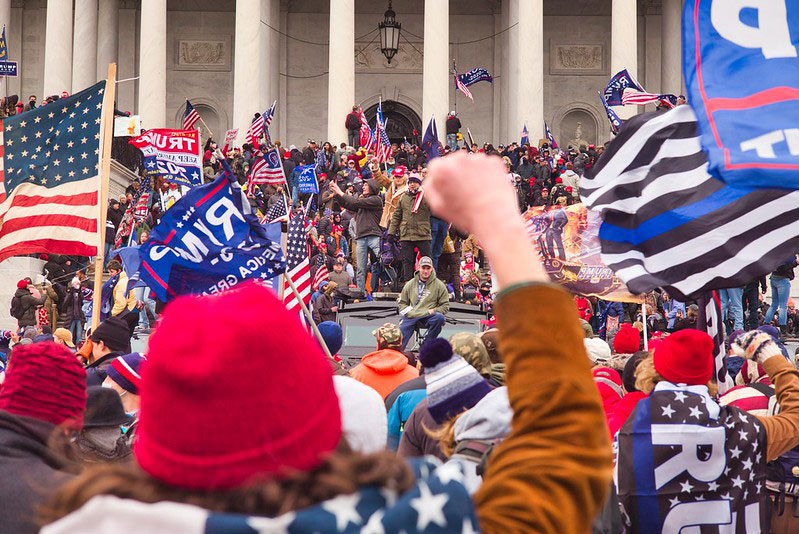Study Explores Links Between Leadership, Social Media, and Violence During the Jan. 6 Insurrection
Northwestern researchers analyze new data to understand how violent protests are related to a leader’s social media use
Get all our news
This study is one of the first to show a direct link between an elected leader’s social media activity and the violent behavior of their followers.”
Brayden King
IPR associate

As voting in one of the most contested U.S. presidential elections in decades draws to a close on Nov. 5, many are wondering if election-related violence will follow. A new study by Northwestern researchers examines this issue by using real-time social media posts and video from the Jan. 6, 2021, “March on the Capitol” to analyze former President Donald Trump’s rhetoric, online and during his rally speech, and how it affected levels of violence that day.
The study shows that Trump’s rally speech and tweets on Jan. 6 predict how much violence and weapon use occurred at the Capitol, as well as #StopTheSteal tweets.
In an era where protests involving brute force are growing in number and seen as a likely source of increased collective violence, the scientific understanding of the links between protests and leaders’ social media activity remains under debate—an impetus that drove the study, the researchers say.
“Our research found that then-President Trump’s tweets on Jan. 6 explained changes in the magnitude of violence, armed conflict, and chemical weapon deployment over the course of the day,” said network scientist, sociologist, and IPR associate Brian Uzzi, who co-authored the study. “The timing and sentiment of Trump’s tweets predicted surges in both the ferocity and length of rioters' lethal force and their use of weapons. Trump’s tweets also predicted the number and sentiment of tweeted communications among rioters and online observers during the insurrection.”
The research used data generated on Jan. 6 that covered more than 1,100 live footage videos, all of Trump’s tweets and his rally speech, other rally speeches, and more than 7,500 #StopTheSteal tweets. The researchers used Granger regression—a statistical method used to test whether one time-series of data predicts another times-series of data—to analyze the links between the tweets, speeches, and the severity and duration of outbreaks of violence and weapons used.
“Our findings show that an authority figure’s online activity and emotional rhetoric are associated with a peaceful protest turning violent,” explained political and organizational sociologist and IPR associate Brayden King. “This study is one of the first to show a direct link between an elected leader’s social media activity and the violent behavior of their followers.”
The researchers recommend using caution when generalizing these findings, as they are drawn from a study of a particular case and setting. The situation was influenced by factors like how American elections are run and the widespread ownership of deadly weapons in the U.S. The study authors call for more research to understand when and how leaders can use their relationships with followers to incite them to take violent actions.
The study, “Quantifying Social Media Predictors of Violence During the January 6 U.S. Capitol Insurrection Using Granger Causality,” was published in The Journal of Royal Society Interface, a publication of one of the world’s leading scientific academies dedicated to promoting excellence in science for the benefit of humanity.
Brian Uzzi is the Richard L. Thomas Professor of Leadership and co-director of the Northwestern Institute on Complex Systems (NICO) and the Ryan Institute on Complexity at Kellogg (RIC). Brayden G. King is the Max McGraw Chair of Management and the Environment and Professor of Management and Organizations. Both are faculty in Northwestern’s Kellogg School of Management and IPR associates. Research specialist Qinghua Lee also contributed to the study.
Photo credit: Flickr; B. Davis
Published: November 5, 2024.


